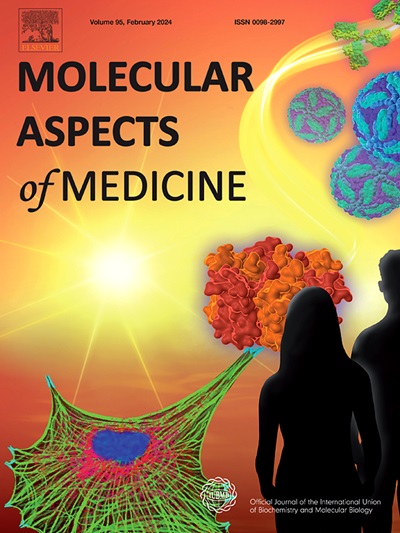Targeting and engineering biomarkers for prostate cancer therapy
IF 10.3
2区 医学
Q1 BIOCHEMISTRY & MOLECULAR BIOLOGY
引用次数: 0
Abstract
Prostate cancer (PCa) is the second most commonly occurring cancer among men worldwide. Although the clinical management of PCa has significantly improved, a number of limitations have been identified in both early diagnosis and therapeutic treatment. Because multiple studies show that prostate-specific antigen (PSA) screening frequently results in overdiagnosis and overtreatment, the use of PSA alone as a diagnostic marker for PCa screening has been controversial. For individuals with locally advanced or metastatic PCa, androgen deprivation therapy (ADT) is the standard initially successful treatment; nonetheless, the majority of patients will eventually develop lethal metastatic castration-resistant prostate cancer (CRPC). Alternative treatment options, including chemo-, immuno-,or radio-therapy, can only prolong the survival of CRPC patients for several months with the most developing resistance. Considering this background, there is an urgent need to discuss about selective prostate-specific biomarkers that can predict clinically relevant PCa diagnosis and to develop biomarker-driven treatments to counteract CRPC. This review addresses several PCa-specific biomarkers that will assist physicians in determining which patients are at risk of having high-grade PCa, focusing on the clinical relevance of these biomarker-based tests among PCa patients. Secondly, this review highlights the effective use of these markers as drug targets to develop precision medicine or targeted therapies to counteract CRPC. Altogether, translating this biomarker-based research into the clinic will pave the way for the effective execution of personalized therapies for the benefit of healthcare providers, the biopharmaceutical industry, and patients.

前列腺癌治疗的靶向和工程生物标志物
前列腺癌(PCa)是世界范围内第二常见的男性癌症。尽管前列腺癌的临床管理有了显著改善,但在早期诊断和治疗治疗方面仍存在一些局限性。由于多项研究表明前列腺特异性抗原(PSA)筛查经常导致过度诊断和过度治疗,因此单独使用PSA作为前列腺特异性抗原筛查的诊断标志物一直存在争议。对于局部晚期或转移性前列腺癌患者,雄激素剥夺疗法(ADT)是标准的初步成功治疗;然而,大多数患者最终会发展为致命的转移性去势抵抗性前列腺癌(CRPC)。其他治疗方案,包括化疗、免疫或放疗,只能延长CRPC患者的生存几个月,且耐药性最严重。考虑到这一背景,迫切需要讨论能够预测临床相关PCa诊断的选择性前列腺特异性生物标志物,并开发生物标志物驱动的治疗方法来对抗CRPC。本文综述了几种PCa特异性生物标志物,这些生物标志物将帮助医生确定哪些患者有患高级别PCa的风险,重点关注这些基于生物标志物的检测在PCa患者中的临床相关性。其次,本文综述了这些标记物作为药物靶点的有效利用,以开发对抗CRPC的精准医学或靶向治疗。总之,将这种基于生物标志物的研究转化为临床将为有效实施个性化治疗铺平道路,从而使医疗保健提供者、生物制药行业和患者受益。
本文章由计算机程序翻译,如有差异,请以英文原文为准。
求助全文
约1分钟内获得全文
求助全文
来源期刊

Molecular Aspects of Medicine
医学-生化与分子生物学
CiteScore
18.20
自引率
0.00%
发文量
85
审稿时长
55 days
期刊介绍:
Molecular Aspects of Medicine is a review journal that serves as an official publication of the International Union of Biochemistry and Molecular Biology. It caters to physicians and biomedical scientists and aims to bridge the gap between these two fields. The journal encourages practicing clinical scientists to contribute by providing extended reviews on the molecular aspects of a specific medical field. These articles are written in a way that appeals to both doctors who may struggle with basic science and basic scientists who may have limited awareness of clinical practice issues. The journal covers a wide range of medical topics to showcase the molecular insights gained from basic science and highlight the challenging problems that medicine presents to the scientific community.
 求助内容:
求助内容: 应助结果提醒方式:
应助结果提醒方式:


